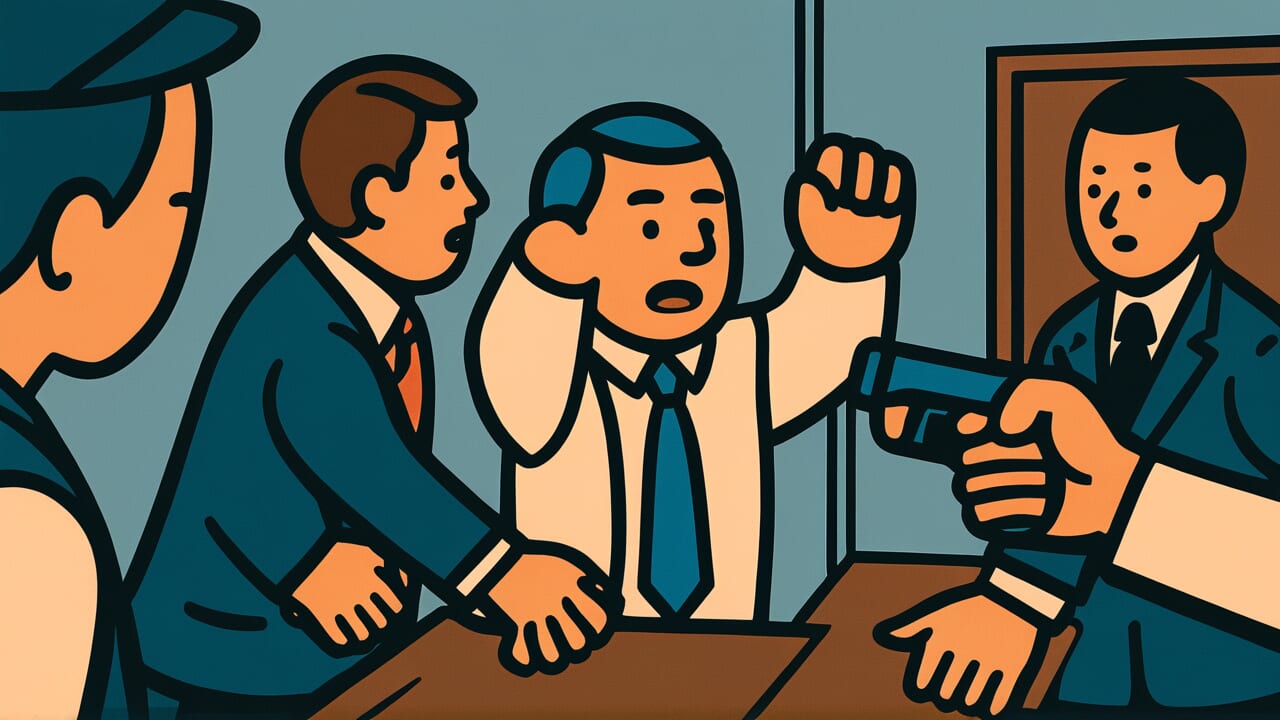How to Read “If a fight is sold to you, you must buy it”
Urareta kenka wa kawaneba naranu
Meaning of “If a fight is sold to you, you must buy it”
This proverb means that when someone challenges or provokes you, you must face them directly rather than running away.
“If a fight is sold to you” refers to a conflict you didn’t start yourself. Instead, the other person provoked or attacked you first.
“You must buy it” strongly asserts that you have an obligation to accept the challenge and respond boldly.
This proverb is mainly used in situations involving honor or reputation. It applies when you face unreasonable attacks, unjust criticism, or when you must fight to protect your position or beliefs.
Today, people also use it in business competition or when defending their rights. The proverb doesn’t only refer to physical fights.
It also applies to conflicts of words and ideas.
Origin and Etymology
No definite written records remain about the exact origin of this proverb. However, the structure of the phrase offers interesting insights.
The expression “a fight is sold” likely emerged during the Edo period when commercial culture flourished. Applying business terms like “sell” and “buy” to fights is an idea that could only arise in a society where economic activity deeply penetrated common people’s lives.
The phrase “must buy” is particularly noteworthy. It doesn’t just say “should buy” but uses a strong expression of obligation.
This likely connects deeply with the concept of honor in bushido, the samurai code. In Edo period samurai society, failing to respond to a challenge was considered shameful and caused loss of face.
The paired expressions “to sell a fight” and “to buy a fight” are unique Japanese metaphors that treat conflict like merchandise.
Viewing a challenge from an opponent as a “product” and “purchasing” it—meaning accepting it—reflects a distinctive Japanese aesthetic regarding conflict.
Usage Examples
- A rival company started a price war, but I resolved that if a fight is sold to you, you must buy it
- I received baseless criticism on social media, but thinking that if a fight is sold to you, you must buy it, I decided to publish the facts
Universal Wisdom
Behind this proverb’s long transmission lies a universal principle: the “duty to respond” in human society. Why do people feel they must respond to conflicts others start?
It’s because humans are social beings who confirm their position through others’ evaluations. Ignoring a challenge is sometimes seen as weakness and can endanger your social standing.
Our ancestors understood this harsh reality of human society.
However, this proverb hides another deep truth. “Standing up to face” something is not mere reaction but a choice made by your own will.
The expression “must buy” implies making an active decision rather than being passively drawn in.
People can run away. But the more you run, the more you lose something inside yourself. That something is self-respect, pride, and proof that you are yourself.
Our ancestors knew that some things can only be protected by fighting.
This proverb is also an answer to the fundamental question of what human dignity means.
When AI Hears This
Buying a fight is clearly a loss if you look at just one instance. You lose time and effort, and risk injury.
But when viewed as a repeated game, the calculation reverses.
Game theory experiments show interesting data. In repeated prisoner’s dilemma games, players who always cooperate get exploited by aggressive players and finish last.
Meanwhile, players who always retaliate when attacked suffer short-term losses but achieve the highest scores long-term. In other words, once a reputation for “fighting back” is established, opponents stop attacking in the first place.
What matters here is “credibility of commitment.” Just saying “I’ll fight back” means nothing. Only by actually retaliating, even at a cost, do you create deterrence.
People learn “it’s better not to mess with this person.” For example, if a convenience store is known to always report shoplifters to police, shoplifting becomes less likely there.
The mathematical beauty of this strategy is that short-term losses convert to long-term gains. The cost of buying one fight is far cheaper than the total cost of ten fights you avoid afterward.
Lessons for Today
This proverb teaches modern people the importance of “courage to discern when to fight.”
In today’s world, you encounter “fights being sold” in various forms: criticism on social media, unreasonable treatment at work, unjust demands.
You don’t need to respond to everything. But when something truly important is threatened—your core values or dignity—you need the resolve to face it rather than run.
The key is not reacting emotionally. Calmly assess the situation and judge whether this is a challenge worth accepting.
If you decide to fight, don’t be half-hearted. Clearly assert your position and protect what needs protecting. That attitude builds your own credibility and dignity.
Sometimes, if you don’t fight, you can’t remain yourself. This proverb urges you to live with conviction and strength, not a life of constant accommodation and compromise.



Comments